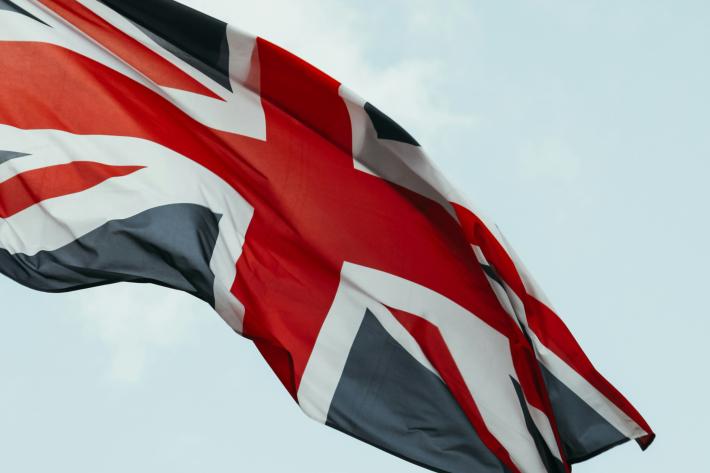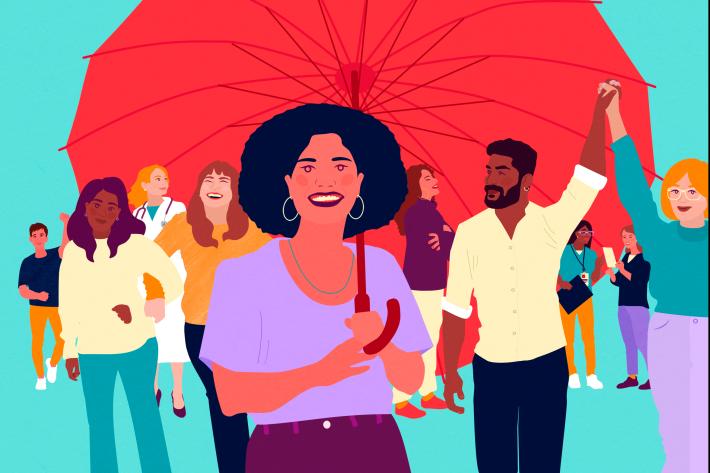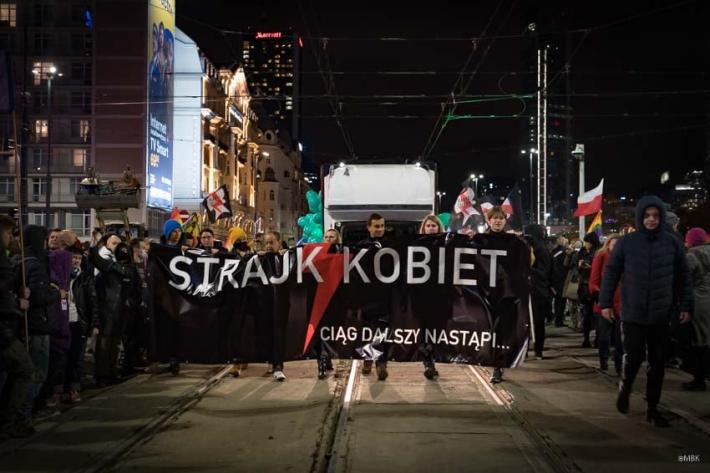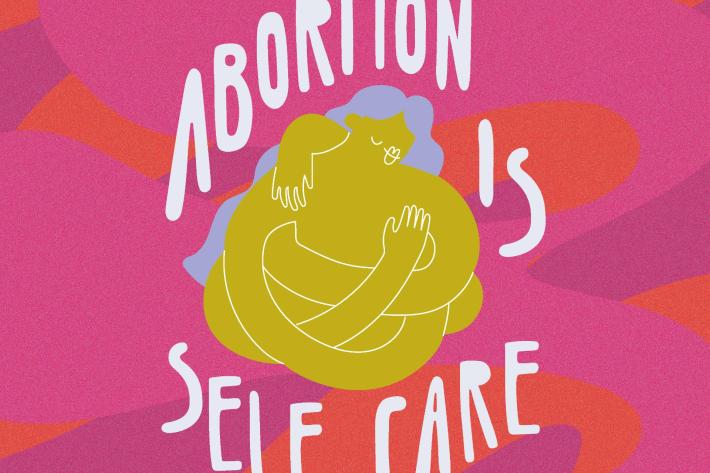
Spotlight
A selection of news from across the Federation

European Commission's new Women's Rights Roadmap includes SRHR—Now we need action
On 7 March, the EC released a new political declaration committing to uphold and advance women's rights. We welcome the inclusion of SRHR and other key topics. Now impactful actions are needed.
Filter our news by:


| 08 March 2022
Poland: A Year On, Abortion Ruling Harms Women
(Brussels, October 19, 2021) – Women, girls, and all pregnant people have faced extreme barriers to accessing legal abortions in the year since a Constitutional Tribunal ruling virtually banned legal abortion in Poland, 14 human rights organizations said today. Since the ruling, women human rights defenders have also faced an increasingly hostile and dangerous environment. Poland’s authorities should end efforts to undermine reproductive rights and weaken protections from gender-based violence. They should commit to protecting women human rights defenders who have faced ongoing threats and attacks since the October 2020 decision. Escalating death threats since October 9 against Marta Lempart, co-founder of Ognopolski Strajk Kobiet (All-Poland Women’s Strike) and a target of repeated threats for leading demonstrations supporting legal abortion and women’s rights, led to her police protection during public appearances. “The Constitutional Tribunal ruling is causing incalculable harm to women and girls – especially those who are poor, live in rural areas, or are marginalized,” said Urszula Grycuk, international advocacy coordinator at the Federation for Women and Family Planning (Federa) in Poland. “The dignity, freedom and health of pregnant people are compromised because their own government is denying them access to essential reproductive health care.” The organizations are Abortion Support Network, Amnesty International, the Center for Reproductive Rights, CIVICUS, Federa, FOKUS, Human Rights Watch, International Campaign for Women’s Right to Safe Abortion, International Federation for Human Rights (FIDH), International Planned Parenthood Federation-European Network, MSI Reproductive Choices, Le Planning Familial, Riksförbundet för sexuell upplysning/The Swedish Association for Sexual and Reproductive Rights, and Strajk Kobiet/Women’s Strike. Poland’s Constitutional Tribunal, whose independence and legitimacy is profoundly eroded, is widely acknowledged as politically compromised. On October 22, 2020, it ruled that abortion on grounds of “severe and irreversible fetal defect or incurable illness that threatens the fetus’ life” was unconstitutional. The government brought the case to the tribunal after parliament failed to adopt legislation with the same effect. The ruling came into force on January 27, 2021. This eliminated one of the few legal grounds for abortion under Poland’s highly restrictive law. Previously, over 90 percent of the approximately 1,000 legal abortions annually in Poland were on these grounds. The ruling came as Covid-19 pandemic restrictions made travel for health care prohibitively difficult and costly. The ruling spurred the country’s largest public protests in decades, led by women human rights defenders. Activists and women’s rights groups reported that the ruling had a significant chilling effect as people seeking abortions and medical professionals feared repercussions. Abortion Without Borders, which aids women in European countries where abortion is illegal or access is highly restricted, reported that 17,000 women in Poland contacted them in the six months after the ruling for help accessing abortion, and that they continue to receive about 800 calls a month. Federa, a Polish reproductive health and rights organization, reported conducting approximately 8,100 consultations in the 11 months after the ruling, 3 times as many as during the same period in previous years. This included calls to its helpline and over 5,000 emails concerning access to abortion and other sexual and reproductive health services. Since the Law and Justice party came to power in 2015, Poland’s government has repeatedly moved to further curb sexual and reproductive health and rights, including by supporting a 2016 draft bill for a total abortion ban that parliament rejected following mass public protest. The government also supported a draft bill, introduced by an ultra-conservative group, to essentially criminalize comprehensive sexuality education. The bill has been in committee since April 2020. These bills are “civic initiatives,” which require public signatures to be considered. In September 2021, the same group introduced a new civic initiative “Stop Abortion” bill to parliament. It would consider abortion at any stage a homicide and would bring criminal penalties against women who have abortions, and anyone who assists them, with punishment of up to 25 years in prison. The bill is backed by Ordo Iuris Institute for Legal Culture, an ultra-conservative, anti-choice, and anti-lesbian, gay, bisexual, transgender, and intersex (LGBTI) group. Women’s rights organizations and parliament members of the opposition Lewica party are collecting signatures for a civic initiative bill, “Legal Abortion Without Compromise,” which would permit abortion without restriction as to reason up to the twelfth week of pregnancy. It would permit abortion after 12 weeks in cases of risk to the person’s mental or physical health, a non-viable pregnancy, or pregnancy resulting from rape or incest. Evidence consistently demonstrates that laws restricting or criminalizing abortion do not eliminate it, but rather drive people to seek abortion through means that may put their mental and physical health at risk and diminish their autonomy and dignity. The United Nations Human Rights Committee has said that as part of the obligation to protect the right to life of pregnant people, states should not apply criminal sanctions against anyone undergoing abortion or medical service providers assisting them. In July, the European Court of Human Rights (ECtHR) announced that it will address complaints from Polish women who may be victims of violations of the European Convention on Human Rights and Fundamental Freedoms due to the Constitutional Tribunal’s abortion ruling. Poland’s government has failed to effectively implement previous ECtHR judgments concerning access to lawful abortion despite repeated calls and a March judgment by the Committee of Ministers of the Council of Europe. The Law and Justice government has also targeted women’s rights organizations and activists. Activists said that government rhetoric and media campaigns smearing them and their work foster misinformation and hate that can put their safety at risk. Several women’s rights defenders were detained or face what they describe as politically motivated criminal charges for actions during protests following the Constitutional Tribunal’s abortion ruling. Activists received multiple bomb and death threats in February and March for their support of reproductive rights but said that, in many cases, police minimized the security risks and either did not open investigations or failed to pursue them effectively. No one has been held accountable for these threats. Police launched investigations and arrested one man in connection with online death threats to Lempart ahead of her planned appearance at a protest on October 11, and are now providing her protection at public events. The government has undermined efforts to combat gender-based violence, including by initiating Poland’s withdrawal from a landmark European convention on violence against women, the Istanbul Convention. The government referred the convention to the politically compromised Constitutional Tribunal for review due to its definition of “gender.” Campaigns against gender equality have been used to target women’s and lesbian, gay, bisexual, transgender, and intersex rights and those who support them. “Extreme restrictions on abortion are part of a broader assault by Poland’s government on human rights, including women’s rights and LGBTI rights, and the rule of law,” said Marta Lempart, co-founder of Strajk Kobiet. “It should alarm all Europeans that this is happening in their own backyard, even as European governments claim to be leaders on women’s rights and democratic values.” The anti-abortion ruling’s anniversary comes amid increasing tensions between Poland’s government and the European Union after an October 7 Constitutional Tribunal ruling rejecting the binding nature of EU law. It followed a series of EU Court of Justice rulings that the Polish government’s weakening of judicial independence breaches EU law. The European Commission said it “will not hesitate to make use of its powers” under EU treaties to ensure application of EU law and protect people’s rights. Poland’s government should reverse restrictions on reproductive rights and ensure that these rights are upheld in accordance with international law, including the right to access safe abortion. It should cease attacks on women’s rights and women human rights defenders and end moves to undermine the rule of law, democracy, and human rights. The European Commission and EU member states should urgently address rule of law breaches and their impact on women’s human rights, including reproductive rights, in Poland. The European Commission should trigger legal infringement proceedings for Polish authorities’ use of a politically compromised Constitutional Tribunal to erode the rights of people in Poland and undermine democratic checks and balances, in blatant violation of the EU Treaties. The Commission and EU member states should act to protect and support women’s rights defenders and organizations in Poland. Member states should actively support people in Poland seeking access to abortion. The Commission should urgently implement the mechanism tying access to EU funds to respect for EU values and continue its commitment to tie EU Recovery Funds to rule of law guarantees. EU member states should advance and expand scrutiny under Article 7.1 of the Treaty on European Union (TEU) by adopting specific recommendations or voting to determine that there is a clear risk of a serious breach of EU values in Poland, as has been called for also by European Parliament. “Despite fear and repercussions, people in Poland are fighting every day to protect rights that everyone in the EU should be able to exercise freely, including access to safe abortion,” said Hillary Margolis, senior women’s rights researcher at Human Rights Watch. “Women’s rights are on a precipice in Poland, and unless the European Commission and Council act to defend democratic values, more and more women and girls will suffer the consequences.” Press Contact: International Planned Parenthood Federation European Network, in Brussels, Irene Donadio (English, Italian): +32-491-071-93-90; or [email protected]. Twitter: @ippfen

| 16 July 2021
Podcast episode 4: Gender and The Union
Gender and The Union is a podcast exploring why policy changes matter to combat gender-based violence in the European Union, and why relationship and sexuality education is key to creating a more equal and safe future for all. In this 4-episode podcast series, we will create a dialogue between policy makers in the EU and the young people looking to advocate for positive change. In this episode of Gender & The Union we discuss how the European Union and the government of Serbia prevent gender-based violence and fight inequalities, with Ms. Leonetta Pajer, head of Operations at the EU Delegation in Serbia and Gala, 16 years old and youth activist from Serbia. The podcast is moderated by Catherine Bailey Gluckman, programme advisor for youth work at IPPF EN. We have heard how gender equality, human rights, and relationship and sexuality education play an important role in the candidature of Serbia to the EU and how the EU and Serbia are working together to achieve a world free from sexism, violence and all forms of discrimination. Above all the relationship between the EU and Serbia should be a partnership that aspires to fulfil the hopes of young people like Gala. On her side, Gala has shared her expectations following the EU accession process, what progress she hopes to see on gender equality in Serbia, as well as what she is personally doing to better the lives of young people who want access to relationship and sexuality education, and who deserve a future where inequalities are diminished and harmful gender norms are a thing of the past. Quality relationship and sexuality education is necessary to ensure that young people live out the principles of gender equality but policy changes in the areas of rule of law, democracy and health are needed too. We are now looking to both the Serbian government and the EU to make this happen together with young activists like Gala and her peers. This has been the final episode in our podcast series, Gender & The Union. Don't forget to catch up on the other three episodes. This podcast series was commissioned by the International Planned Parenthood Federation European Network, produced by Positive Stories and funded by the European Union’s Rights, Equality and Citizenship Programme (REC 2014-2020), within the framework of the Youth SpectActors project. The content of this podcasts represents only the views of IPPF EN and is its sole responsibility. The European Commission does not accept any responsibility for use that may be made of the information it contains.

| 28 June 2021
Podcast episode 3: Gender and The Union
Gender & The Union is a podcast exploring why policy changes matter to combat gender-based violence in the European Union, and why relationship and sexuality education is key to creating a more equal and safe future for all. In this 4-episode podcast series, we will create a dialogue between policy makers in the EU and the young people looking to advocate for positive change. In this episode of Gender and the Union we discuss what the European Union and all of us can do to create a society free from sexism and discrimination, with the EU Commissioner for Equality, Helena Dalli and our sexual and reproductive rights youth advocate, Amanda, from Sweden. The podcast is moderated by Catherine Bailey Gluckman, programme advisor for youth work at IPPF EN. The value of gender equality is close to the hearts of European citizens – with 91% of Europeans believing that its promotion is important to ensuring a fair and democratic society. So what steps is the European Commission taking to diminish gender inequalities? Commissioner Dalli tells us about what the EU is doing to tackle intersecting discrimination and reach those whose needs are greatest. Commissioner Dalli affirms that sexual and reproductive health and rights are at the core of gender equality, speaks out in favour of relationship and sexuality education (RSE), and affirms that RSE should be an essential component of the future EU Directive on Gender-Based Violence, as a way to prevent violence. We’ve heard how things are locally and nationally in Sweden including some inspiring best practices in how Amanda works with young people to make sure they feel empowered to take decisions about their lives and challenge harmful stereotypes. Amanda has underlined very clearly that it’s not just about a good legal framework in place to ensure sexuality education is delivered, implementation is crucial. And there needs to be investment in sustainable programmes, training new educators and school teachers continuously and ensuring that curricula for sexuality education are relevant up-to-date and that they reflect enough of a range of important life skills. Finally, we also heard that there is a lot of power to prevent violence, to fight inequalities and to adopt strong relationship & sexuality education programmes within the reach of individual EU countries themselves. This does require states to seize that responsibility and do the work. But it is also empowering to realize it’s achievable. That data is out there, keen and willing educators are out there, a supportive international community of practice exists. It’s entirely within the power of EU states to make the most of these resources and do their duty to ensure the safety of young people. As Helena Dalli said, this is the way to go. This podcast series was commissioned by the International Planned Parenthood Federation European Network, produced by Positive Stories and funded by the European Union’s Rights, Equality and Citizenship Programme (REC 2014-2020), within the framework of the Youth SpectActors project. The content of this podcasts represents only the views of IPPF EN and is its sole responsibility. The European Commission does not accept any responsibility for use that may be made of the information it contains.

| 16 June 2021
Podcast episode 2: Gender and The Union
Gender & The Union is a podcast exploring why policy changes matter to combat gender-based violence in the European Union, and why relationship and sexuality education is key to creating a more equal and safe future for all. In this 4-episode podcast series, we will create a dialogue between policy makers in the EU and the young people looking to advocate for positive change. In this episode of Gender and The Union we discuss how relationship and sexuality education can be a way to prevent gender inequalities and gender-based violence, together with Predrag Fred MATIĆ, Member of the European Parliament & our youth activist, Luize. The podcast is moderated by Catherine Bailey Gluckman, programme advisor for youth work at IPPF EN. What are the challenges that young people in Latvia face when trying to access relationship and sexuality education? What is the European Parliament doing in terms of improving the lives of young people and advancing gender equality? What actions can we take to address violence against women? The answers of all this and more in this episode. We also discuss the landmark position on sexual and reproductive health and rights voted by the European Parliament right after the tapping of this episode. In this report, authored by MEP Predrag Fred Matić, the European Parliament recognised that SRHR is not only a human rights issue; it is also intrinsically linked with gender equality, women’s empowerment and combating gender-based violence. This podcast series was commissioned by the International Planned Parenthood Federation European Network, produced by Positive Stories and funded by the European Union’s Rights, Equality and Citizenship Programme (REC 2014-2020), within the framework of the Youth SpectActors project. The content of this podcasts represents only the views of IPPF EN and is its sole responsibility. The European Commission does not accept any responsibility for use that may be made of the information it contains.

| 24 June 2021
European Parliament adopts landmark position on sexual and reproductive rights
The European Parliament voted today in favour of a landmark report presented by Croatian MEP Predrag Fred Matić on “the situation of sexual and reproductive health and rights in the EU”. While the European Parliament has repeatedly expressed concerns over the lack of full realisation of, and attacks against women’s rights, gender equality and sexual and reproductive health and rights (SRHR), this report is the first of its kind in almost 10 years to give such a degree of political importance to SRHR at EU level. The report addresses the full range of SRHR and highlights the importance of accessing all essential SRH services, including comprehensive sexuality education, contraception, abortion, maternal health and fertility services; and of preventing and addressing sexual and gender-based violence. The vote sends a strong signal that MEPs are fully committed to protect and promote SRHR in the EU at a time when human rights in sexuality and reproduction are increasingly challenged by illiberal leaders, even within the EU, and as the global community makes inspirational commitments to advance SRHR in the Generation Equality Forum. Neil Datta, Secretary for the European Parliamentary Forum for Sexual and Reproductive Rights, said, “Today, the European Parliament assumed its leadership role in strongly upholding the fundamental rights of all Europeans despite deliberate campaigning to incite fear and block the report. Common sense, human rights and values prevailed and MEPs were able to stand up for education and health over ignorance and religious ideology. As awareness about anti-gender movements increases, we can safeguard women’s rights, SRHR and gender equality more effectively”. "The adoption of the report today is a great achievement for the European Parliament and those involved in the negotiations - although protecting the health and rights of everyone should not be controversial. We celebrate the EU’s reinforced commitment to promoting SRHR both within and outside the EU. The EU should now take concrete steps to make the promotion of SRHR for all a priority, both in its internal and external action.” Lisa Goerlitz, Head of Brussels Office, Deutsche Stiftung Weltbevölkerung (DSW). “We now look to the Member States and the European Commission to take the report’s recommendations forward and deliver on sexual and reproductive safety, care and freedom for all. We want to see serious advances on access to sexual and reproductive care as part of a society free from sexism and discrimination,” says Caroline Hickson, Regional Director of the International Planned Parenthood Federation European Network (IPPF EN).

| 08 June 2021
Podcast episode 1: Gender and The Union
Gender and The Union is a podcast exploring why policy changes matter to combat gender-based violence in the European Union, and why relationship and sexuality education is key to creating a more equal and safe future for all. In this 4-episode podcast series, we will create a dialogue between policy makers in the EU and the young people looking to advocate for positive change. In this first episode we discuss prevention of violence through education and dismantling harmful gender norms – with the President of the Commission for Citizenship and Gender Equality of Portugal, Sandra Ribeiro, & our youth activist from Estonia, Susan. The podcast is moderated by Catherine Bailey Gluckman, programme advisor for youth work at IPPF EN. What are the priorities of the Portuguese Presidency of the Council of the European Union when it comes to promoting EU values, including advancing gender equality and combatting gender-based violence? What are the challenges young people are facing concerning violations of gender equality and harmful practices? And how has COVID-19 impacted the lives of women and girls seeking education and safety from violence at home? These are just some of the topics we touch upon. This podcast series was commissioned by the International Planned Parenthood Federation European Network, produced by Positive Stories and funded by the European Union’s Rights, Equality and Citizenship Programme (REC 2014-2020), within the framework of the Youth SpectActors project. The content of this podcasts represents only the views of IPPF EN and is its sole responsibility. The European Commission does not accept any responsibility for use that may be made of the information it contains.
Pagination
- First page
- Previous page
- …
- 6
- 7
- 8
- …
- Next page
- Last page
















